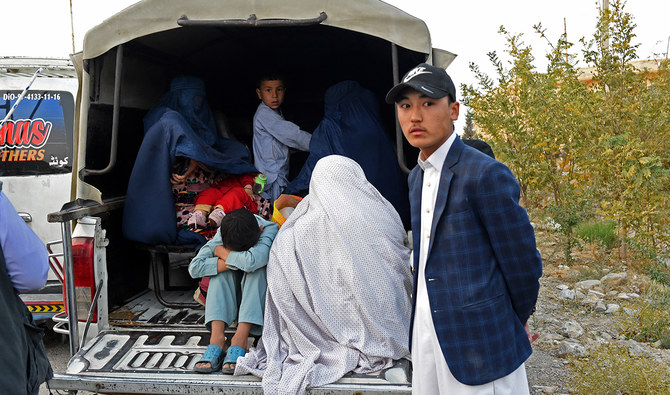ISLAMABAD: Pakistani security forces have started arresting and deporting dozens of undocumented Afghans after a government deadline for them to leave voluntarily expired on Nov. 1, officials said, with many Afghans complaining they were being harassed despite having valid documents and minors and children were also being detained.
Pakistan last month gave foreigners without documents or registration about four weeks to leave of their own accord or face deportation. According to the interior ministry, nearly 150,000 illegal foreigners residing in Pakistan have returned to their respective countries voluntarily since the deadline was announced on Oct. 3.
The government has set up 49 deportation centers to temporarily house illegal migrants, including an estimated 1.7 million undocumented Afghans, and said anyone found staying in the country without authorization after yesterday, Wednesday, would be taken to one of the facilities before being sent home.
“Today, we said goodbye to 64 Afghan nationals as they began their journey back home,” Interior Minister Sarfraz Bugti said. “This action is a testament to Pakistan’s determination to repatriate any individuals residing in the country without proper documentation.”
Officials in the Sindh, Balochistan and Khyber Pakhtunkhwa provinces confirmed deportations had begun in their jurisdictions.
“Today, we started the operation and collected the data of the people,” said Saad bin Asad, the Deputy Commissioner Quetta, the provincial capital of Balochistan which borders Afghanistan and is home to around 250,000 illegal Afghan migrants.
“Most of them had voluntarily gone to Afghanistan and their houses were empty. Out of these people who left, today we have taken 450 people in custody and we will take the same action tomorrow. 13,759 people who had been identified are to be processed, this will be our phase one.”
Although the government insists its expulsion order does not specifically target Afghans, they form the largest number of undocumented foreigners in the South Asian nation, many of them having lived in Pakistan their entire lives. Also, since the deadline announcement, Islamabad has blamed Afghans for multiple militant attacks, including 14 of this year’s 24 suicide bombings. The government also says hosting millions of refugees has drained its resources amid an economic crisis.
“This is the original identity card of the father whose two young children were caught from [Quetta’s] Meezan Chowk and brought here, their ages are 15 and 16 years,” said Abdul Majeed, the relative of the arrested boys told media at a holding center. “The policemen are acting arbitrarily, it is their will that whoever comes in their sight will be caught.”
Local resident Haibat Khan also said children had been detained.
“The policemen have picked up children of young ages and have brought the children of Form B [Child Registration Certificate], POC [Pakistan Origin Card] and ACC [Afghan Citizen Card]here,” Khan told the AFP.
“I spoke to two DSPs (Deputy Superintendent of police) and said that they are registered with valid cards, and the interior minister said they [people with valid documents] won’t be bothered but still they are harassing people and arresting people and women.”
Muhammad Hassan, a baker in Karachi, said he was leaving Pakistan despite the fact that he had a PoR card, but his children did not.
“So, that’s why we are leaving because we are afraid [police will arrest the children.”
Indeed, while several government officials have repeatedly said in the past weeks those with Proof of Registration and Afghan Citizenship Cards would not be expelled by Nov. 1, many Afghans have complained of harassment and arrests despite having valid documents. Authorities deny this.
“When we go to work, policemen stop us and inquire where we are from, what our purpose is, and where we are going,” said Luftullah, an Afghan who was boarding a bus from Karachi to the border earlier this week.
“I then show them my card, the Afghan Citizen Card. After seeing it, they say it has expired. I also show them a letter from the government of Pakistan, which states that those who have Afghan [Citizen] Cards can stay in the country, but they refuse to accept it, call it a lie and then say all kinds of things.”
Bugti, the interior minister, said complaints against any government official would be taken into “strictest cognizance and no negligence will be tolerated in this regard.”
Besides Western nations and UN agencies, Afghanistan’s Taliban government has also urged Pakistan to give undocumented Afghans in the country more time to leave.
In a statement earlier this week, they “asked them [Pakistan] to not forcibly deport Afghans with little notice but to give them time to prepare.”
“In countries where Afghans live, they have not threatened the security of those countries, nor have they been the cause of instability.”
















